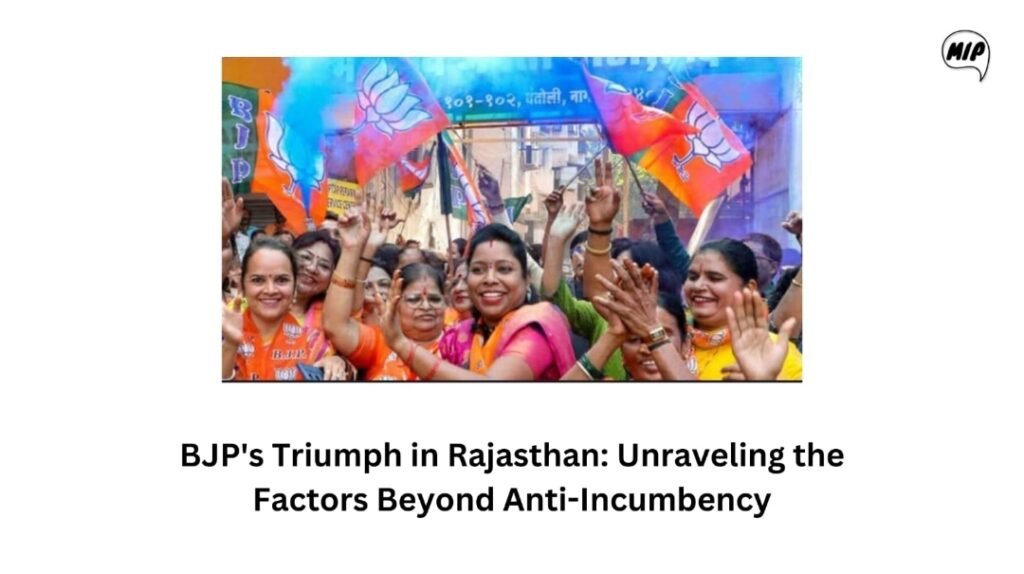
The saffron party is roaring ahead in Rajasthan with a lead in 115 seats out of 199, as per the latest trends displayed by the Election Commission of India. This probable victory is largely attributed to the usual template in the state in which the incumbent gets voted out in every Assembly election.
Some hoped Chief Minister Ashok Gehlot would be able to put up a strong fight against anti-incumbency with welfare schemes ranging from subsidised cooking gas and smartphones for women, to the promise to return to the flagship Old Pension Scheme for government employees.
But the Bharatiya Janata Party (BJP) entered the race for Rajasthan with equally strong promises of subsidies and cash transfers to clinch a win in the desert state. Some of the promises made by the BJP include a higher Minimum Support Price (MSP) for procurement of wheat, a savings bond worth Rs 2 lakh for every household in the state where a daughter is born, and free scooties for meritorious students pursuing higher education.
In fact, given the nature of the pre-poll promises made by these two political parties, there seemed to be little to no difference between them. Thus, the question arises: what could have given the BJP the edge in Rajasthan beyond the simple anti-incumbency rationale?
According to BJP National Spokesperson Gopal Krishna Agarwal, what worked in their favour was voters differentiating between “Modi guarantee and false promises.”
People have given them (Congress) a chance in Karnataka and Himachal Pradesh and earlier in Madhya Pradesh, but they did not deliver. And, on the other hand, there is the Modi guarantee, wherein no stone will be left unturned to deliver on the promises,” Agarwal, who looks at economic affairs for the party, told Moneycontrol.
With the BJP racing towards a victory in Rajasthan, it would be important to see whether the party can deliver on the pre-poll promises while maintaining fiscal prudence.
Several experts and institutions have for long raised an alarm over political parties announcing ‘freebies’ in the garb of welfarism to garner votes. Many of them, including the Reserve Bank of India (RBI), have consistently highlighted the need to distinguish freebies from public or merit goods, which bring larger economic benefits.
The key risk associated with rampant subsidies or freebies is an increase in the fiscal deficit, as it is likely to create additional pressure on revenues. Rajasthan is targeting a fiscal deficit of 4 percent of gross state domestic product (GSDP) for the current fiscal year. In 2022-23, as per the revised estimates, the fiscal gap of the state is expected to be 4.3 percent of GSDP. Though this would be marginally lower than the budget estimate of 4.4 percent, it is higher than the indicative target of 4 percent set by the Centre.
However, according to Agarwal, people trust the “double engine sarkar” and there are no concerns about the newly-elected BJP government sacrificing financial prudence for pre-poll promises since majority of state schemes are funded by the central government, which has “shown strong fiscal consolidation.”
If some well-wishers of Congress are to be believed, then the grand old party’s loss is hardly about welfarism but is reportedly due to the party’s internal squabbles.
“First analysis of the Congress winners in Rajasthan Assembly Election! Most of the young candidates backed by Sachin Pilot have won. This shows had more candidates been changed, Congress could have done better!” Political analyst Tehseen Poonawalla said on X (formerly Twitter) on December 3.
Beyond everything, what the 3-1 BJP victory seemingly indicates is that Brand Modi continues to be effective in the Hindi heartland despite the absence of prominent and clear chief minister candidates from the party for Madhya Pradesh, Rajasthan, and Chhattisgarh.
As BJP’s Agarwal puts it, “The Modi Model works.”